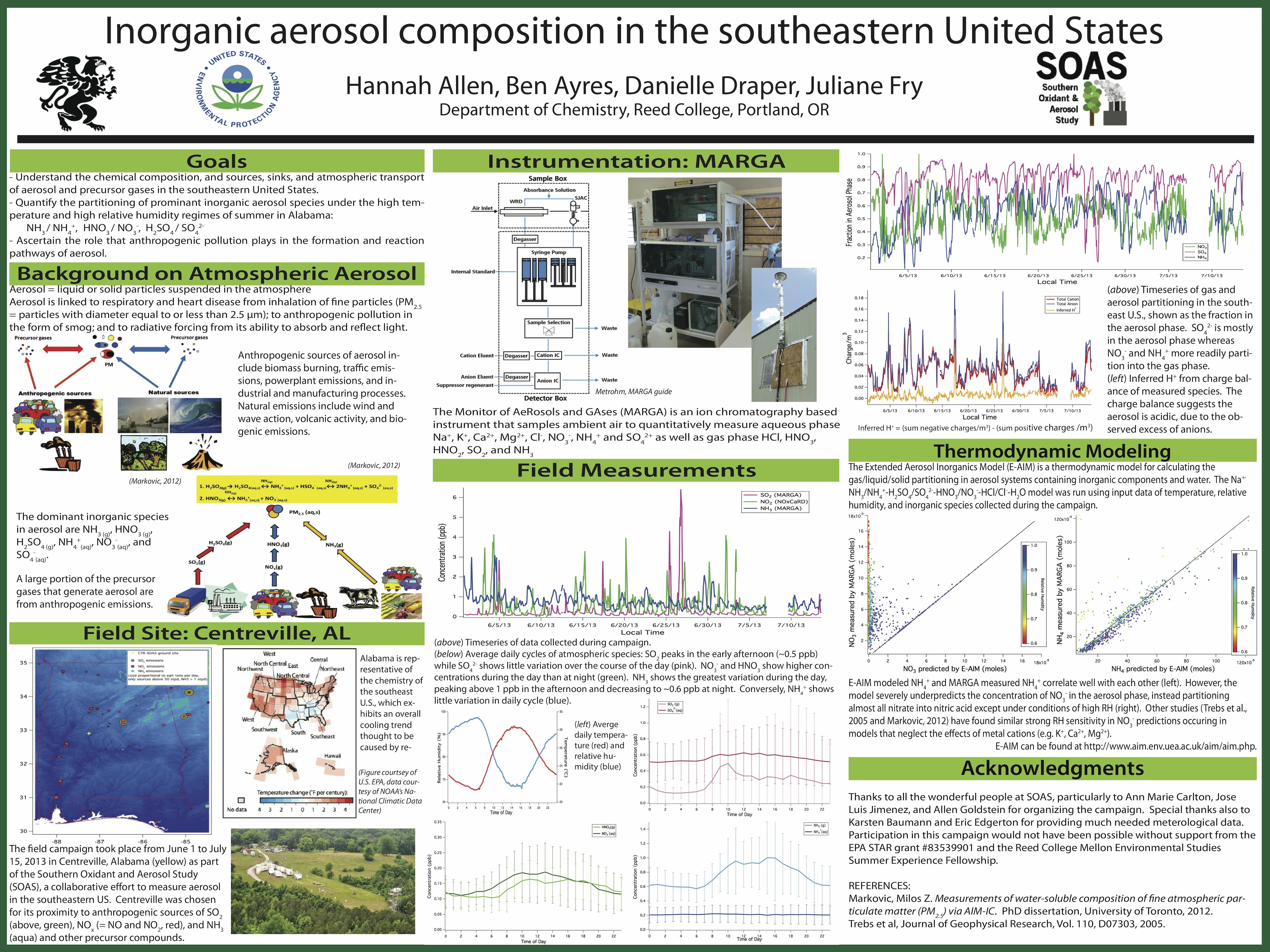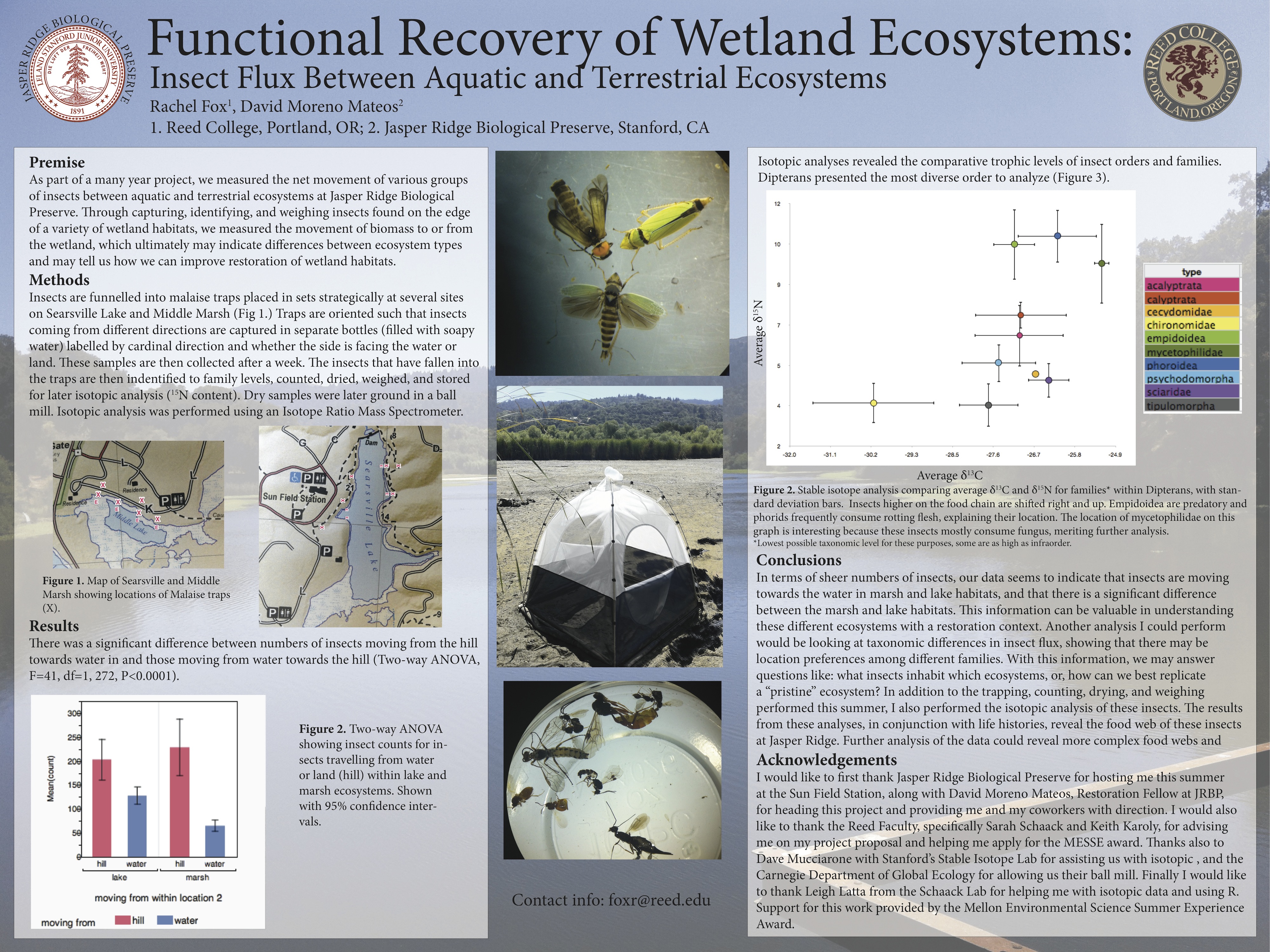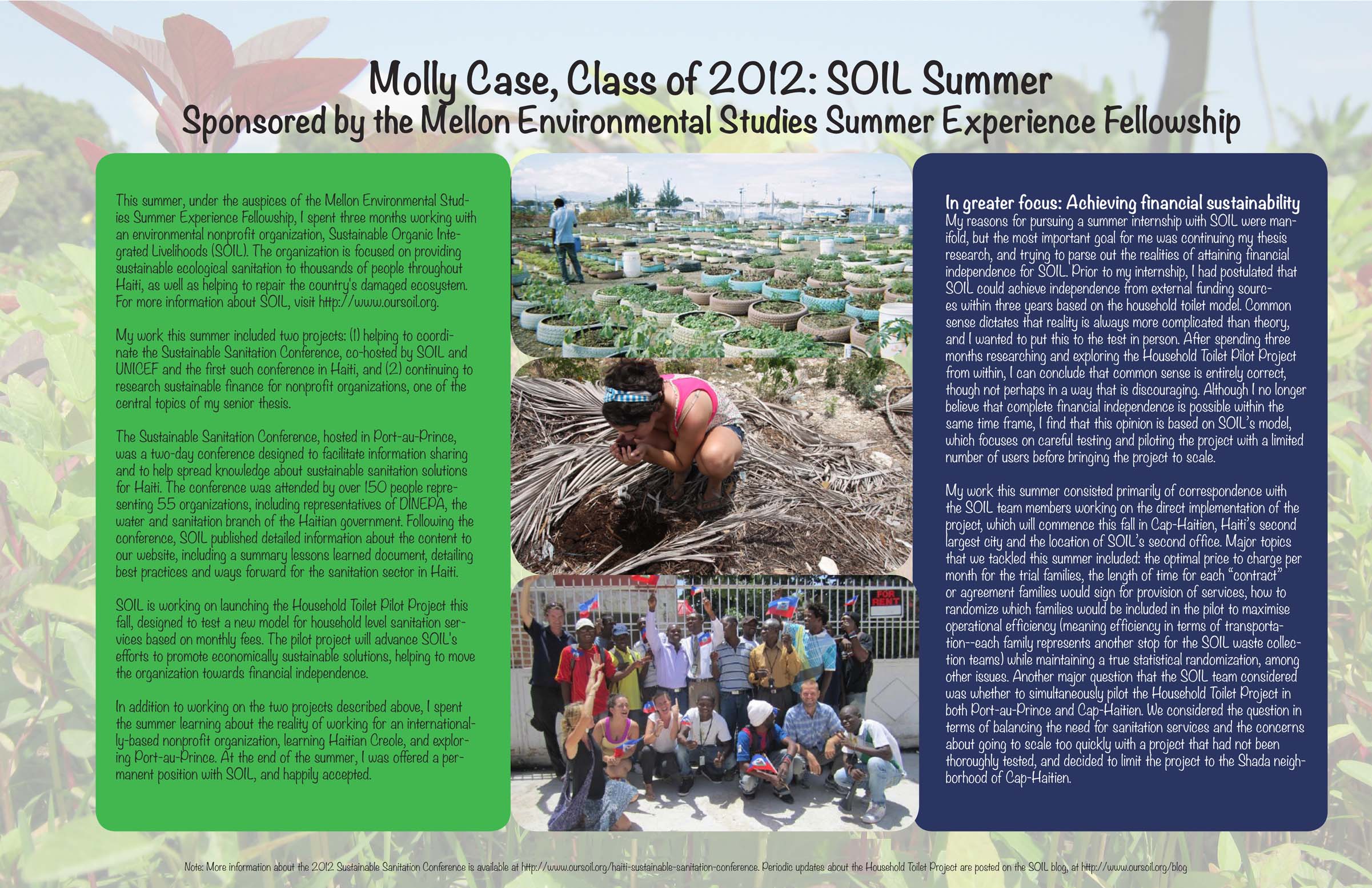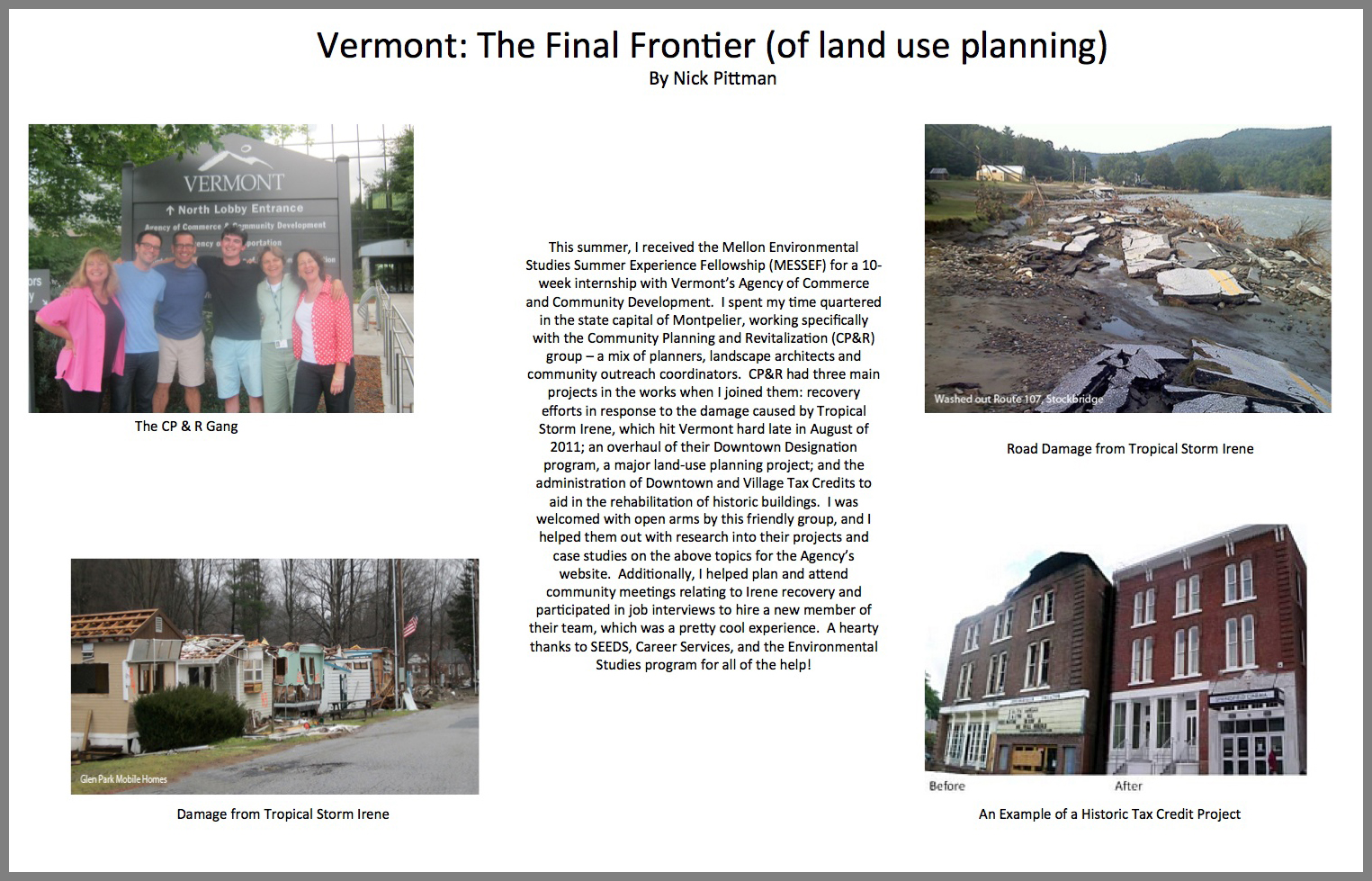Research Opportunities
Environmental Studies Fellowship Opportunities
Udall Fellowship
*Full-time sophomores and juniors only
The Morris K. Udall and Stewart L. Udall Foundation awards approximately 55 scholarships each year to undergraduate students who intend to pursue careers related to the environment and conservation as well as to Native American and Alaska Native undergraduate students who intend to pursue careers in health care and tribal policy.
Find more information and apply here.
Mason Student Opportunity Fellowship
The Mason Student Opportunity Fellowship was created with the goal of supporting research work related to the Reed canyon. Research proposals for broader environmental research will be considered if no canyon-related proposals are submitted. The next application deadline will be March 4, 2026.
Environmental Studies Summer Experience Fellowship
Environmental Studies Summer Experience Fellowships are intended to support continuing Reed students pursuing environmentally-themed summer opportunities. These opportunities might include internships at nonprofit agencies or field research internships/training (on or off-campus). Award amount is $6,600 stipend for 10 weeks engagement, with up to $1,000 additional funds for budgeted travel and supplies. Previous awards (funded by the Mellon Foundation and listed as MESSE awards) are listed below.
Proposals will be judged on their environmental focus and relevance to your field of study or professional goals. Opportunities that expand beyond the Reed curriculum will be given priority, but applicants must justify the relevance of the experience to their academic program. Faculty recommendation and the appropriateness of the sponsoring institution will also be considered.
All applicants are strongly encouraged to consult with members of the Environmental Studies committee in preparing the application. The application can be downloaded here.
Submission deadline for Summer 2026 Fellowships will be noon, Wed, March 4th, 2026.
Please submit the following application materials to the Environmental Studies Committee via email to Rachel Sanchez:
- One confidential letter of support (e-mailed directly to Rachel Sanchez) from a Reed faculty or staff member who can speak to your qualifications and your proposed project.
- A resume describing your relevant work, volunteer, and course experiences
- Project description (1,000-word limit) detailing the internship or research experience you plan to undertake. Include a description of your activities and how the opportunity will benefit your educational progress. What will you bring back to Reed from the experience? How does the project fit into your broader environmental training and build off your prior experiences? What are the desired outcomes of the experience, and how do they relate to your career goals?
- A letter of support from the sponsoring organization or faculty member (e-mailed directly to Rachel Sanchez). The letter should indicate support for the project as described in your proposal.
- Detailed budget of any expenses above the $6,600 stipend (travel and equipment/supplies) needed to complete your project, up to $1,000. Any non-consumable equipment or supplies will be returned to the college at completion of the project. On your budget page, if applicable, please also list other funding sources you will apply for or use, including any pay you will receive from your sponsoring organization. The $1,000 travel/supplies supplement is by no means automatic; you must include text justifying any additional expenses that you will require; applications lacking a budget will be considered requests for stipend support only.
In the Fall semester following your Fellowship, you will be expected to present the outcome of your project to the Reed community.
Late or incomplete applications will not be considered.
The Environmental Studies committee will evaluate the applications shortly after the application deadline.
Contact the ES committee with any questions.
Past Fellowship awards
Summer 2022 ESSE: Grace Burton, "Green Synthesized Silver Nanoparticles and their Potential Antibacterial Efficacy"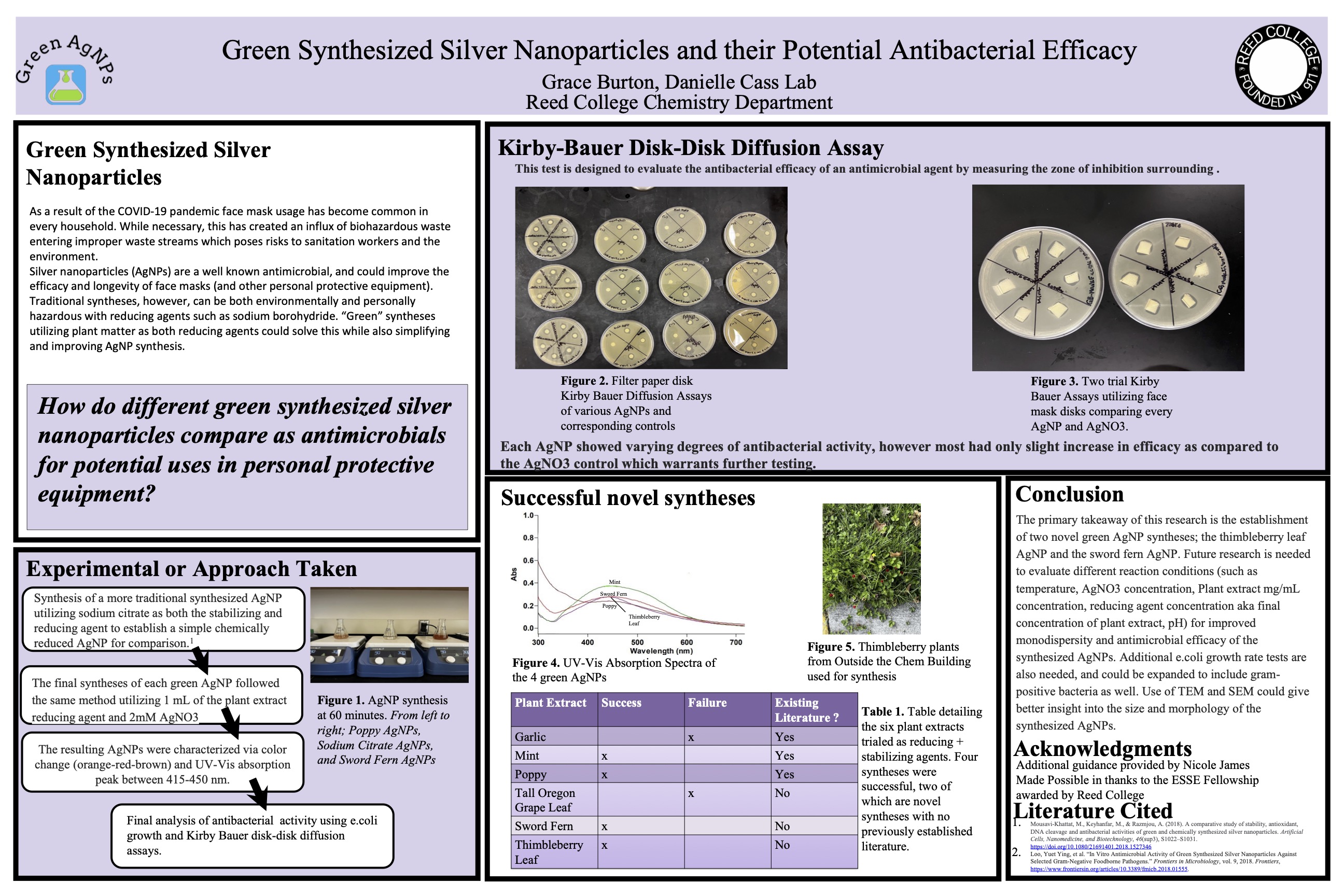
Project Summary: Grace spent the summer in the Reed College chmistry deparment investigating how different green synthesized silver nanoparticles compare as antimicrobials for potential uses in personal protective equipment.
[click on image to view the presentation in a new window]
Summer 2022 Dusenberry Fund ESSE: Robin Eckensberger, Oregon Encyclopedia Climate Change Project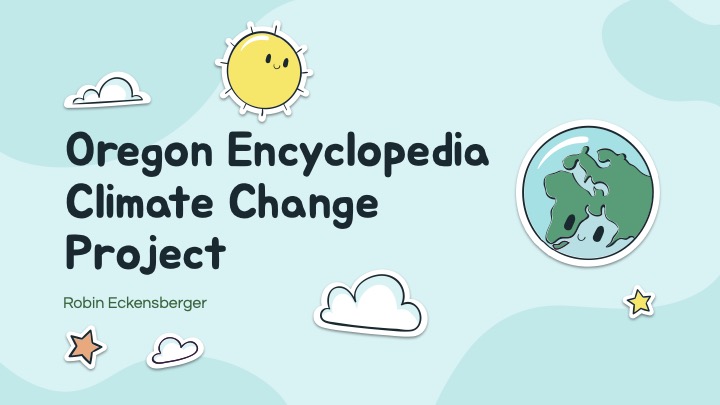
Project Summary: Robin spent the summer working with the Oregon Historical Society on the Oregon Encyclopeia's exhibit about climate change in Oregon, which showcased entries written by historians, scholars, students, and other experts.
[click on image to view the presentation in a new window]
Summer 2022 Paul Siegel ESSE: Finn Newman, Salmon Valley Stewardship Internship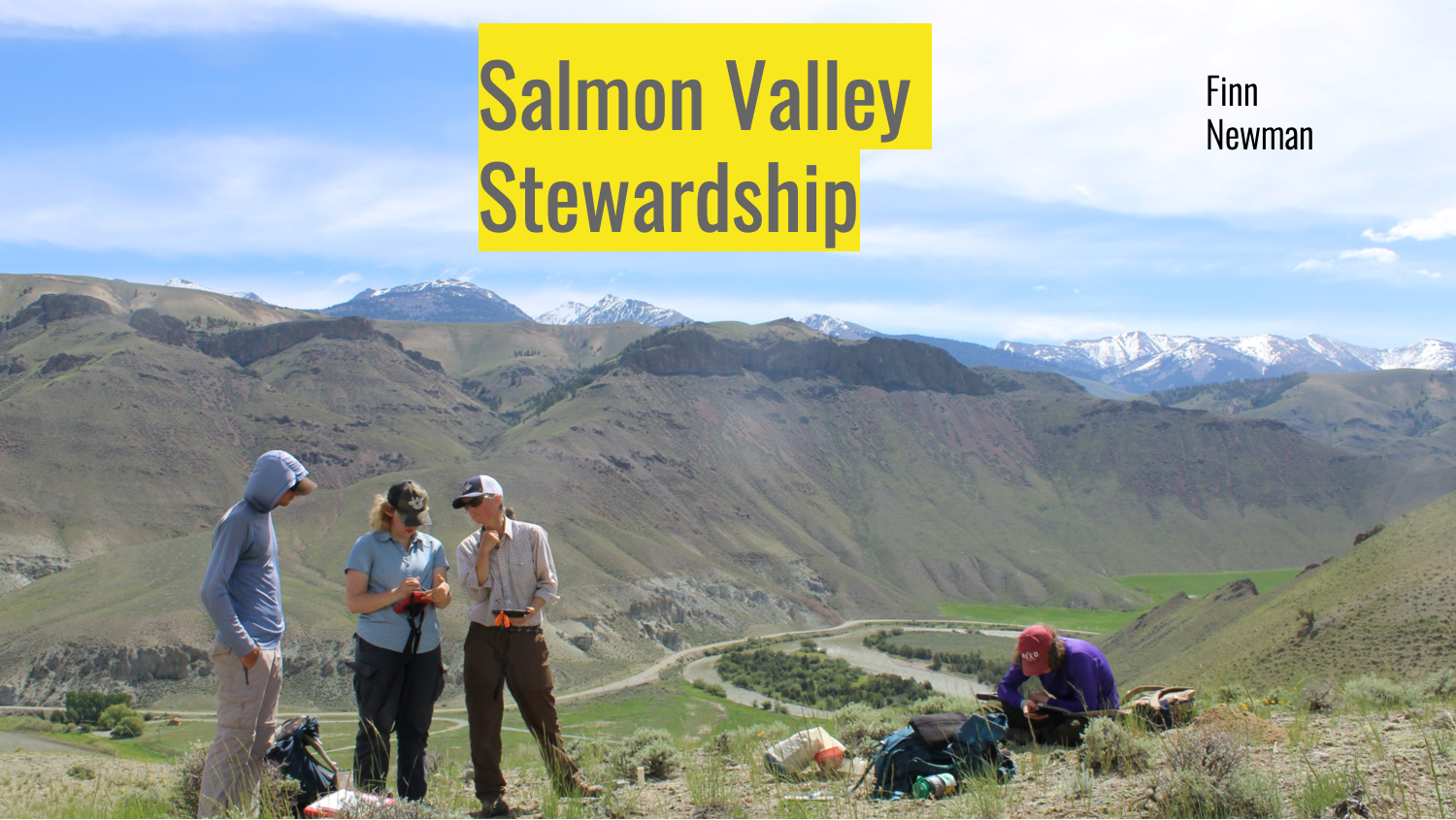
Project Summary: Finn was an intern with Salmon Valley Stewardship, a non-profit in Salmon Idaho. His internship focused on natural resource conservation and management including sage-grouse habitat inventorying, monarch butterfly monitoring and whitebark pine management.
[click on image to view the presentation in a new window]
Summer 2022 Dusenberry Fund ESSE: Ali Pardini, "Use of ICP-MS to Determine Cu and Zn Levels in Carex obnupta (Slough Sedge) from the Reed College Bioswale"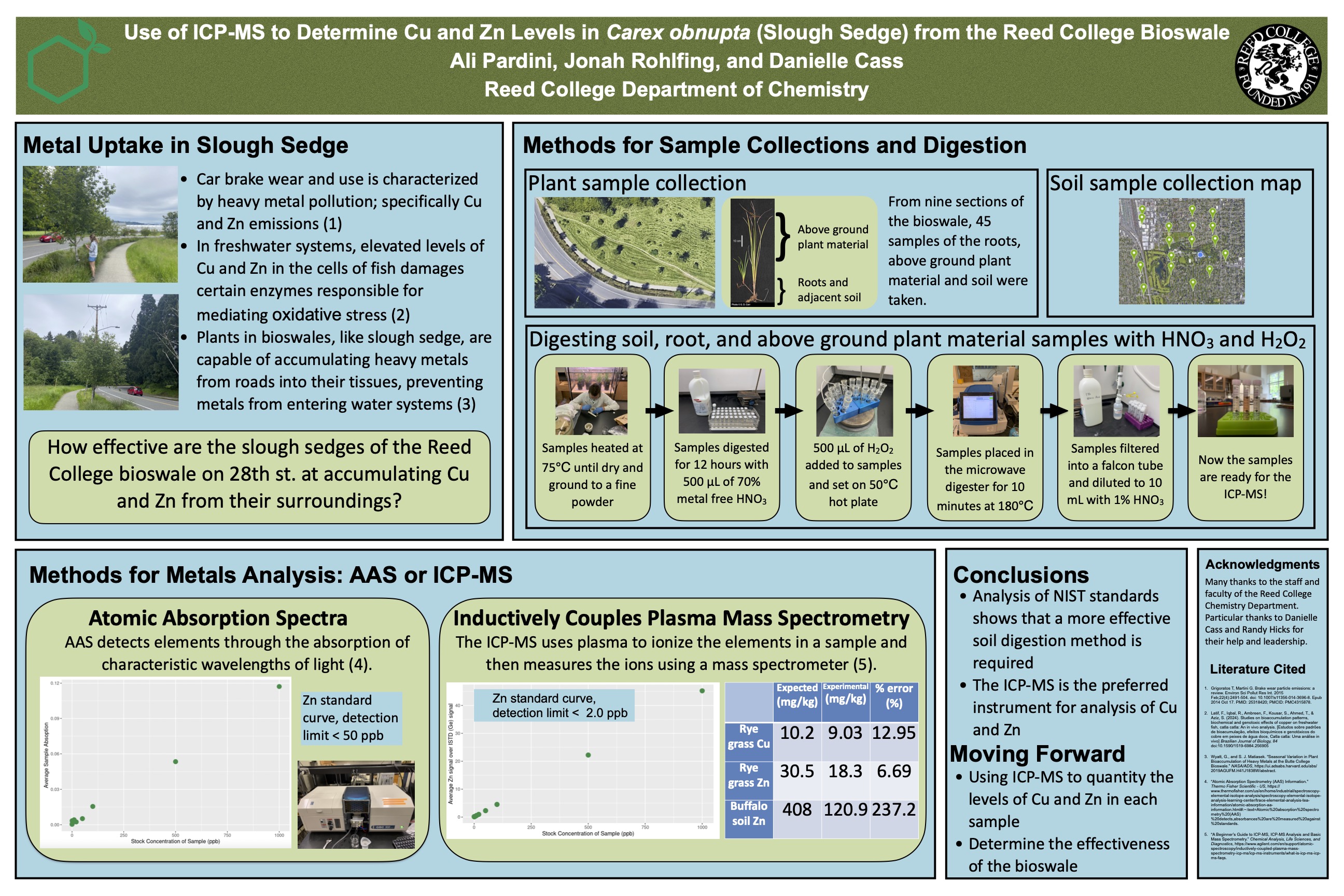
Project Summary: Ali spent the summer in the Reed College chmistry deparment investigating how effective are the slough sedges of the Reed College bioswale on 28th st. at accumulating Cu and Zn from their surroundings.
[click on image to view the presentation in a new window]
Summer 2022 ESSE: Ana Quintana Bernal, "Farm Ecology and Pollinator Education in Salmon, Idaho"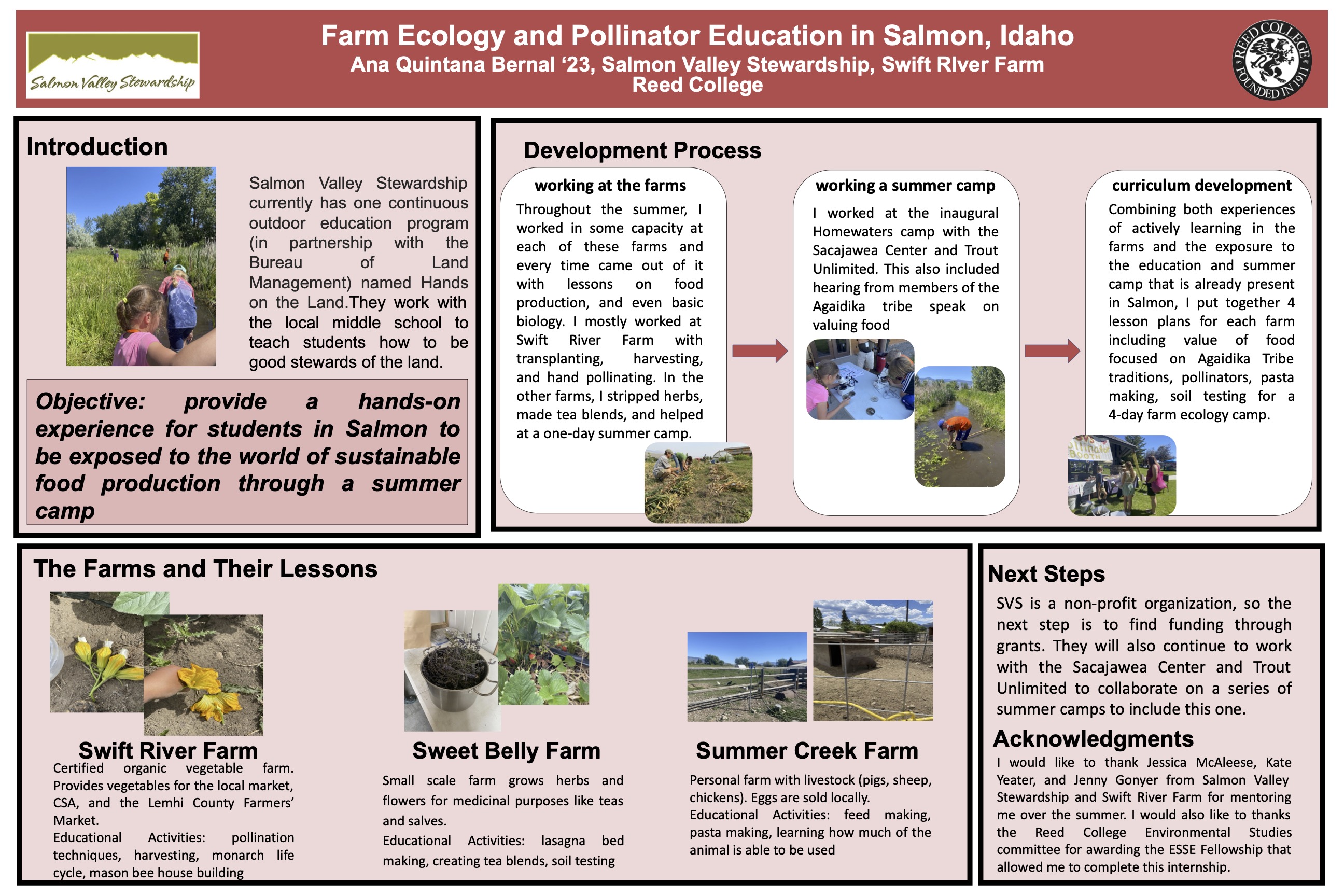
Project Summary: Anna spent the summer participating in a joint internship with Salmon Valley Stewardship and Swift River Farm in Salmon, Idaho providing a hands-on experience for students in Salmon to be exposed to the world of sustainable food production.
[click on image to view the presentation in a new window]
Summer 2019 Paul Siegel ESSE: Sophia Varady, "Factors Influencing Abundance of Sucking Insects on Native Plants in Tropical Agroforesty Systems."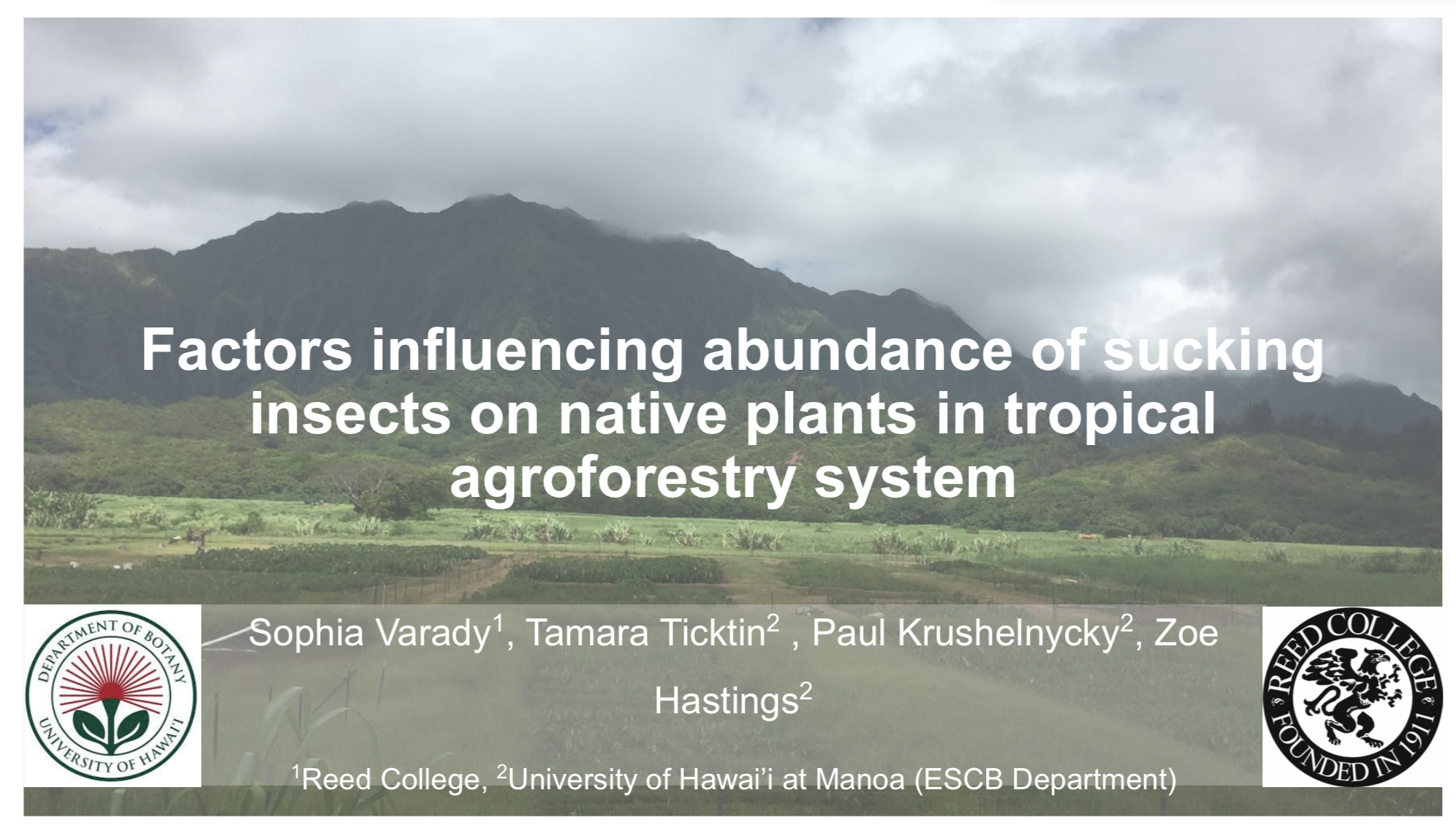
Project Summary: Over the summer Sophia spent the summer conducting resesarch with Dr. Tamara Ticktin at the University of Hawaii at Manoa, to develop an understanding of how changes in plant community affect insect diversity within an pilot agroforestry project.
[click on image to view the presentation in a new window]
Summer 2019 Dusenbery ESSE: Hayden Henderson, "A Climate Action Plant for Reed: Mitigating and Adapting to Environmental Degradation"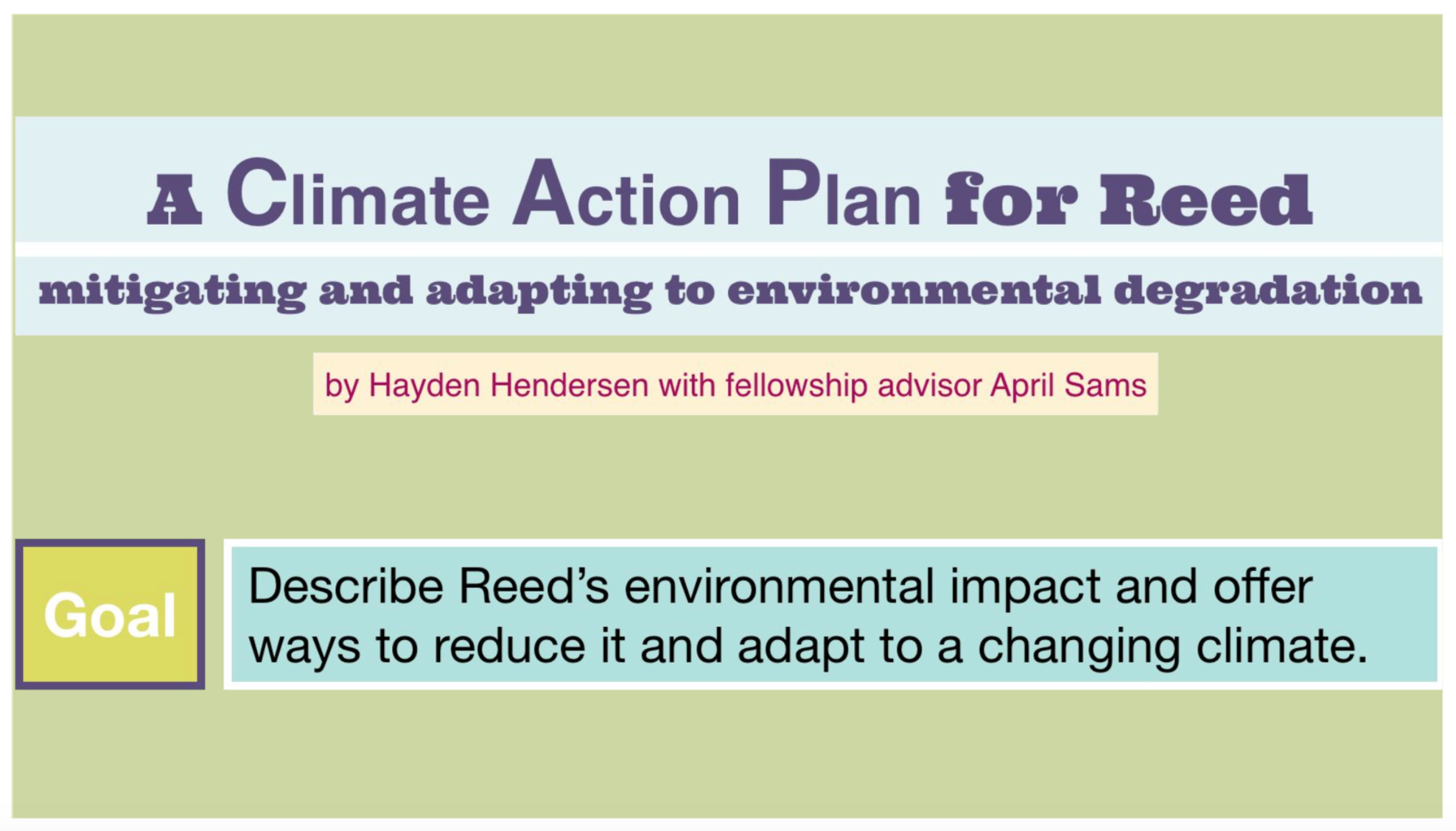
Project Summary: Over the summer Hayden spent the summer working with April Sams and the facilities team in Physical Plant to develop a Climate Action Plan for Reed College. She conducted interviews accross the campus, gathered the school’s existing resource and environmental data, and determined what areas Reed expends the most resources in and what areas Reed could reduce our expenditures and footprints.
[click on image to view the presentation in a new window]
Summer 2019 ESSE: Inda Boving, "Monitoring for Management in Rural Idaho"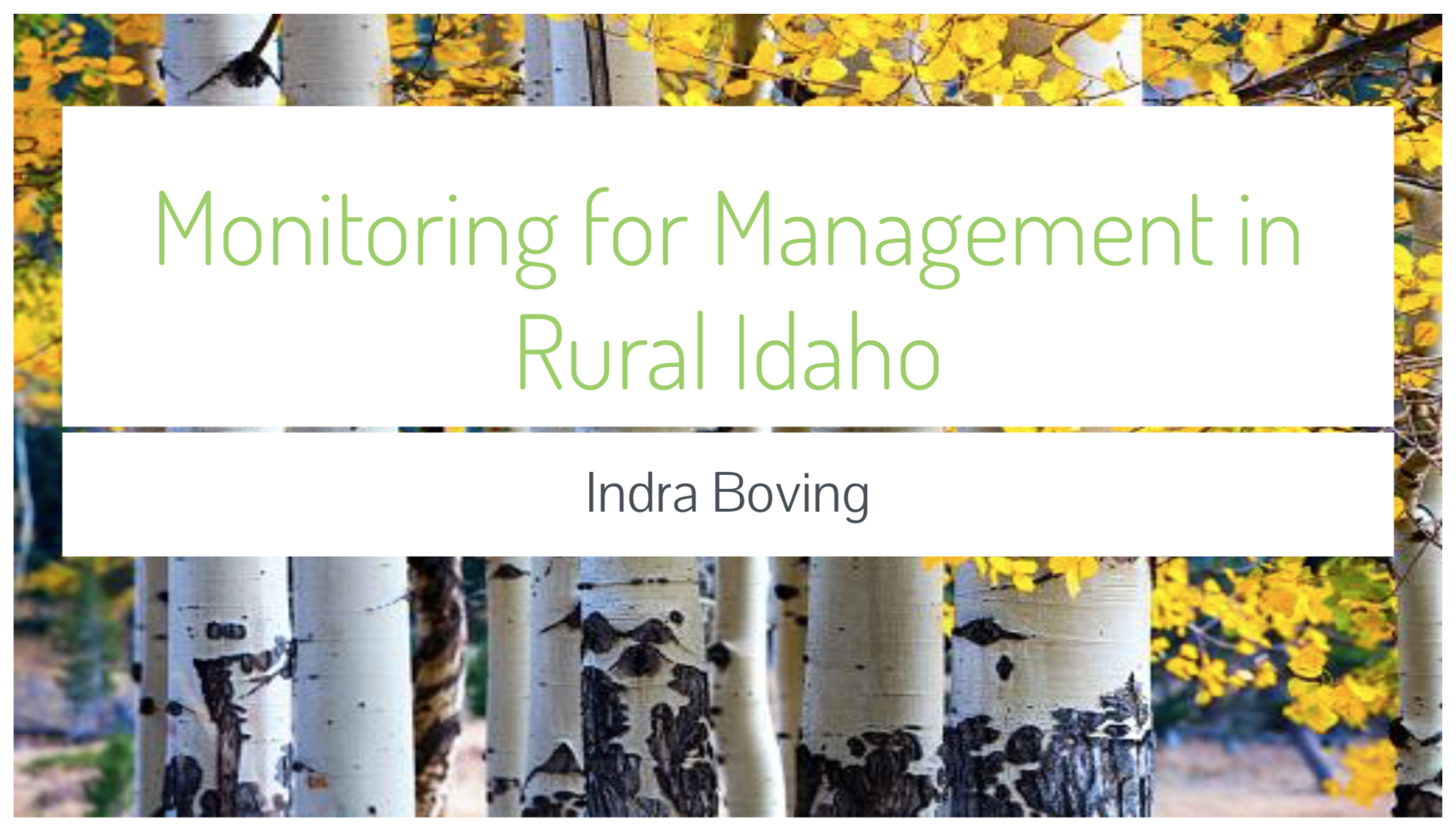
Project Summary: Indra participated in a summer internship with Lemhi Regional Land Trust (LRLT) and Salmon Valley Stewardship (SVS), in Salmon Idaho. Indra engaged in outreach and communication efforts and work on a variety of projects related to ecological monitoring and habitat restoration. In addition she implemented a citizen-science project while working with SVS’s “Adopt an Aspen Stand” program.
[click on image to view the presentation in a new window]
Summer 2019 ESSE: Mary Snook: "Working Landscapes of the American West"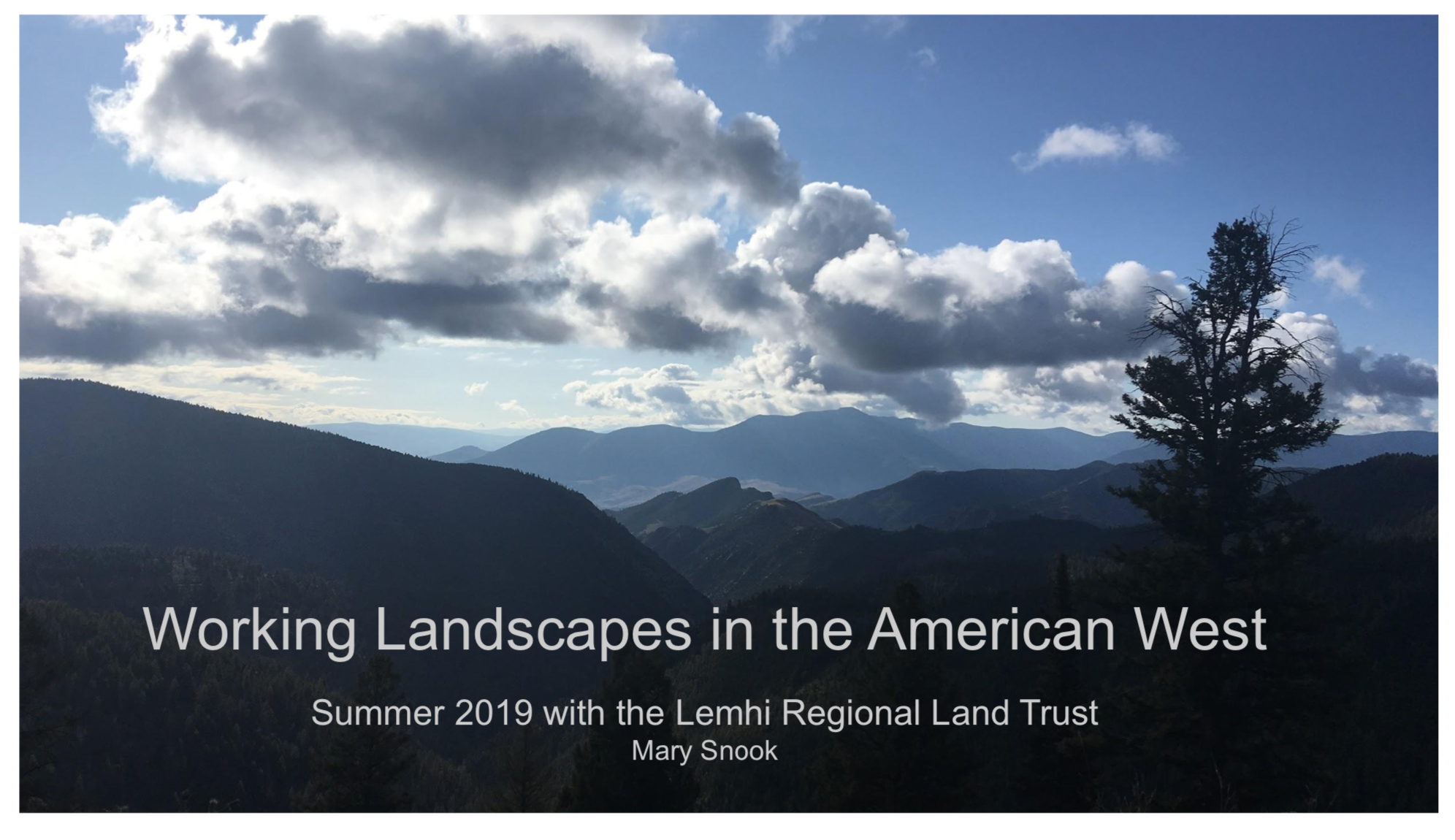
Project Summary: Mary also participated in a summer internship with Lemhi Regional Land Trust (LRLT) and Salmon Valley Stewardship (SVS), in Salmon Idaho. Mary also helped to develope the “Adopt an Aspen Stand” program, conducted ecological monitoring of land that is managed by the LRLT, and helped with the Salmon School Garden Project.
[click on image to view the presentation in a new window]
Summer 2018 Paul Siegel ESSE: Bella Brownwood, "Study of Organic Nitrate Particulate Matter Formation in the Atmosphere"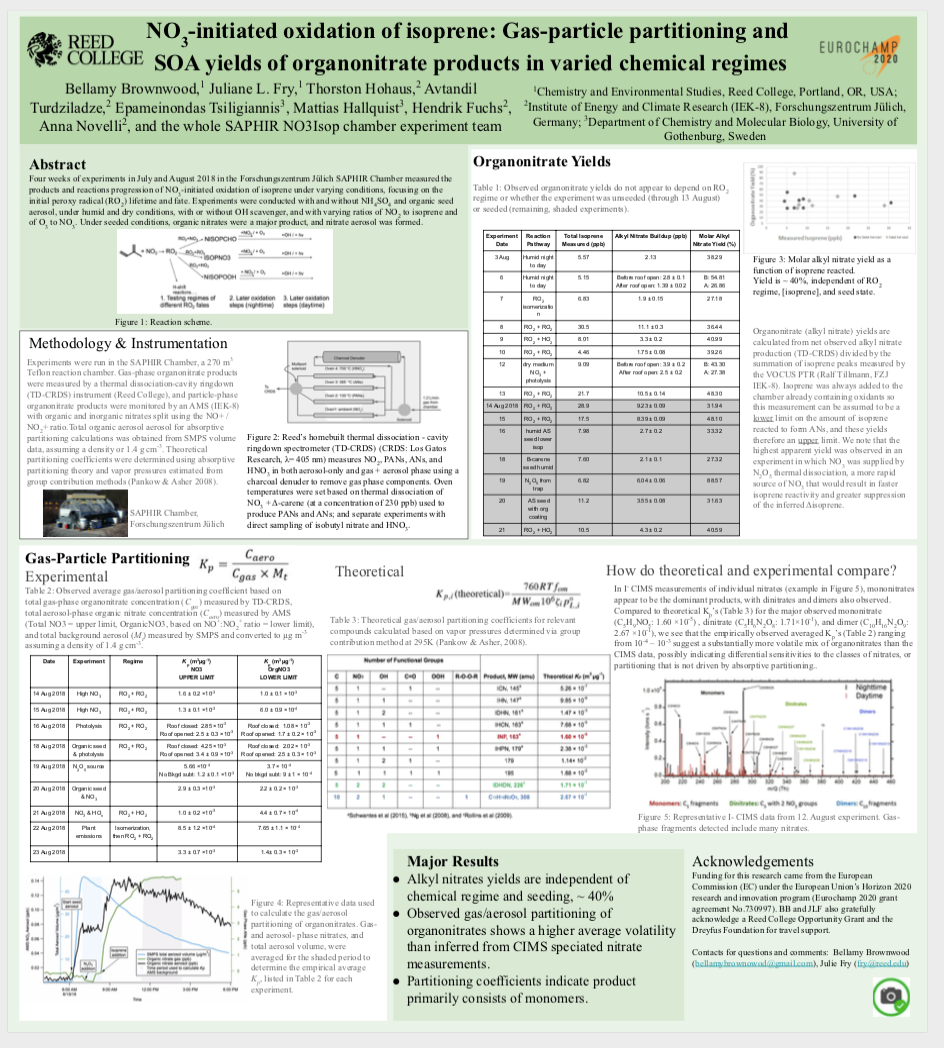
Project Summary: Bella spent the summer studying the atmospheric reactions between nitrate radicals and biogenically-emitted organic compounds to better understand their role creating particulate mattter (PM) that affects the planet's albedo, which is critical to inform global climate models. Bella perfected her protocols in the labs a Reed before traveling to a large reaction chamber at Forschungszentrum Jülich (FZJ), a research center in Germany, to conduct atmospheric simulation experiments as part of a large international collaborative project.
[click on image to view the presentation in a new window]
Summer 2014 Paul Siegel ESSE: Rennie Meyers, "Economies, Ecologies and Lifestyles in the Anthropocene: The Aesthetics of Sustainable Design in Bahamian Tourism"
Project Summary: This summer I worked with Dr. Amelia Moore as a research intern to conduct anthropological research hosted by University of Miami’s Rosenstiel School of Marine and Atmospheric Science on the politics and aesthetics of sustainable design in The Bahamas. I documented and analyzed responses to anthropogenic climate change as reflected in the design of the tourism industry’s built environment and the social worlds of destination design in the National Archives as well as in a multi-site ethnographic practice. Pursuing these anthropological and historical projects in conjunction supplemented our understanding of how nations might undergo a transformation in development design aesthetics and discourse relative to national and international dialogues regarding global climate change and human agency. Click here to find Rennie's blog about her experience.
Summer 2014 MESSE: Mia Reback, "Internship with the City of Portland Bureau of Planning and Sustainability"
Project Summary: I spent the summer researching and writing about sustainable behaviors and climate change communications for the Bureau of Planning and Sustainability’s Sustainability at Work Program. Areas of focus included disposable and durable dishes, green cleaning products, CFLs, reducing waste, employee engagement and case studies of sustainable businesses. I also conducted a market basket survey comparing food prices between CSA baskets, farmers markets and grocery stores.
Summer 2014 MESSE: Adriana Escobedo-Land, "Identifying Soil Microbe Composition for Effective Control of Cyanobacteria in Oregon Nurseries"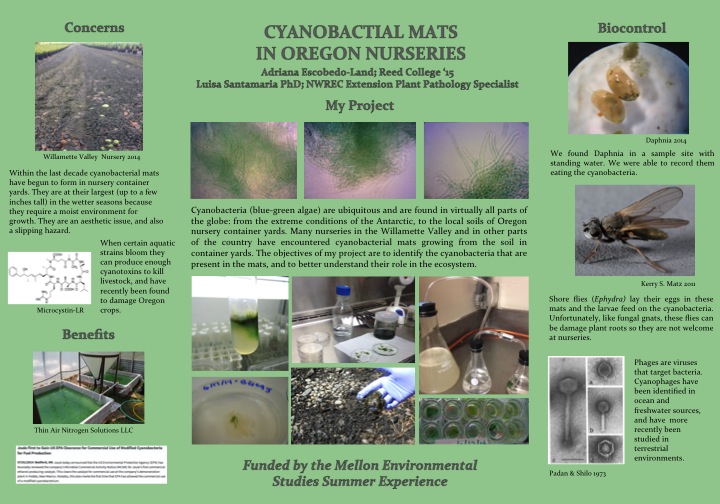
Project Summary: My project this summer took place at the OSU North Willamette Research and Extension Center in Aurora, Oregon with plant pathologist Luisa Santamaria, PhD. Prolific seaweed-like mats, composed primarily of cyanobacteria, have become an issue in nurseries in the recent years. The cause of their proliferation is unknown. I identified cyanobacteria within the mats at a genus level, and reviewed the literature to better understand their physiology and ecological role. I then prepared a fact sheet for extension publication on the biology of the mats, so that nursery growers may make more informed decisions on procedures for mitigating the mats.
Summer 2013 MESSE: Hannah Allen, "Atmospheric aerosol: characterizing the inorganic composition and thermodynamics of aerosol and gases in the Southeastern United States."
Project Summary: Over the summer I travelled to Centerville, Alabama with Prof. Julie Fry to participate in the Southern Oxidant and Aerosol Study (SOAS) field campaign. In Alabama, I used the Monitor for AeRosols and GAses (MARGA) ion chromatography system to gather measurements on the inorganic composition of gases and aerosol in the atmosphere, with the goal of understanding how aerosol contributes to regional climate change in the southeastern United States.
[click on image to view the poster in a new window]
Summer 2013 MESSE: Rachel Fox, "Functional Recovery of Wetland Ecosystems: Insect Flux Between Aquatic and Terrestrial Ecosystems"
Project Summary: As part of a many year project, we measured the net movement of various groups of insects between aquatic and terrestrial ecosystems at Jasper Ridge Biological Preserve. Through capturing, identifying, and weighing insects found on the edge of a variety of wetland habitats, we measured the movement of biomass to or from the wetland, which ultimately may indicate differences between ecosystem types and may tell us how we can improve restoration of wetland habitats.
[click on image to view the poster in a new window]
Summer 2012 MESSE: Molly Case, "Internship with with Sustainable Organic Integrated Livelihoods (SOIL) in Haiti: an environmental nonprofit providing sustainable ecological sanitation and helping to repair the country's damaged ecosystem."
Project Summary: My work this summer included two projects: (1) helping to coordinate the Sustainable Sanitation Conference, co-hosted by SOIL and UNICEF and the first such conference in Haiti, and (2) continuing to research sustainable finance for nonprofit organizations, one of the central topics of my senior thesis.
[click on image to view the poster in a new window]
Summer 2012 MESSE: Nick Pittman, "Internship with Vermont’s Agency of Commerce and Community Development, focused on studying the recovery of towns and businesses following Tropical Storm Irene."
Project Summary: I spent the summer working with the state's Community Planning & Revitalization group, researching how other states had responded to help businesses and homeowners following natural disasters. In addition, I researched other state anti-sprawl and Smart Growth measures, and authored case studies for the department's website.
[click on image to view the poster in a new window]
Summer 2011 MESSE: Rhiana Meade, "Environmental Aquatic Chemistry: Indirect Photodegredation of Dissolved Combined Amino Acids"
Project Summary: In order to better understand the nitrogen cycle, it is crucial to understand mechanism of degradation and the fate of proteins and amino acids in sunlight waters. Thanks to the funding provided by the MESSE fellowship, I was able to spend my summer working in one of the best environmental chemistry labs at one of the finest scientific institutions in the world: the Swiss Federal Institute of Technology (ETH) in Zurich. In the lab of Prof. Dr. Kris McNeill, I studied the photodegredation of a model protein, GAPDH, when attacked by singlet oxygen.
